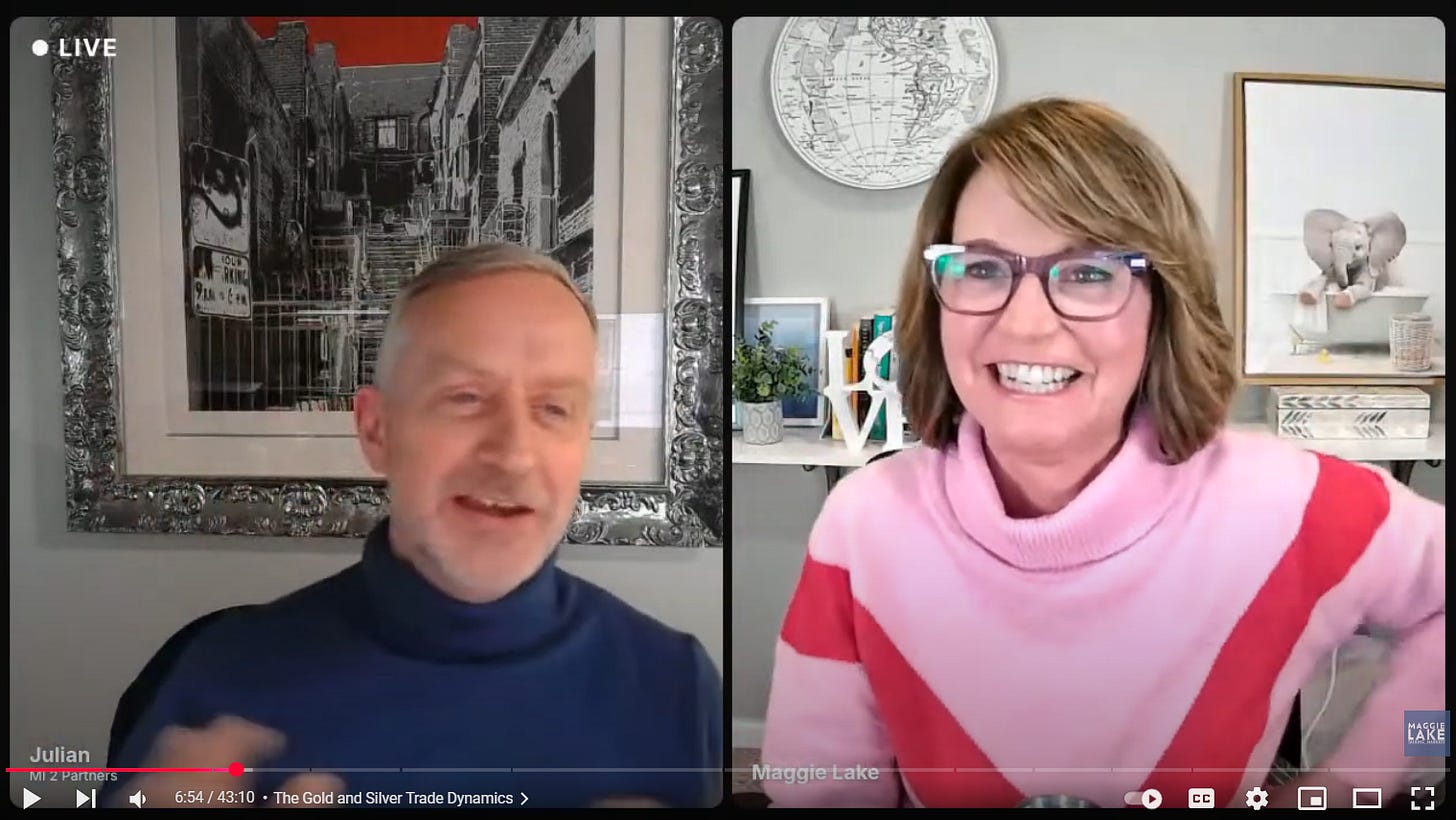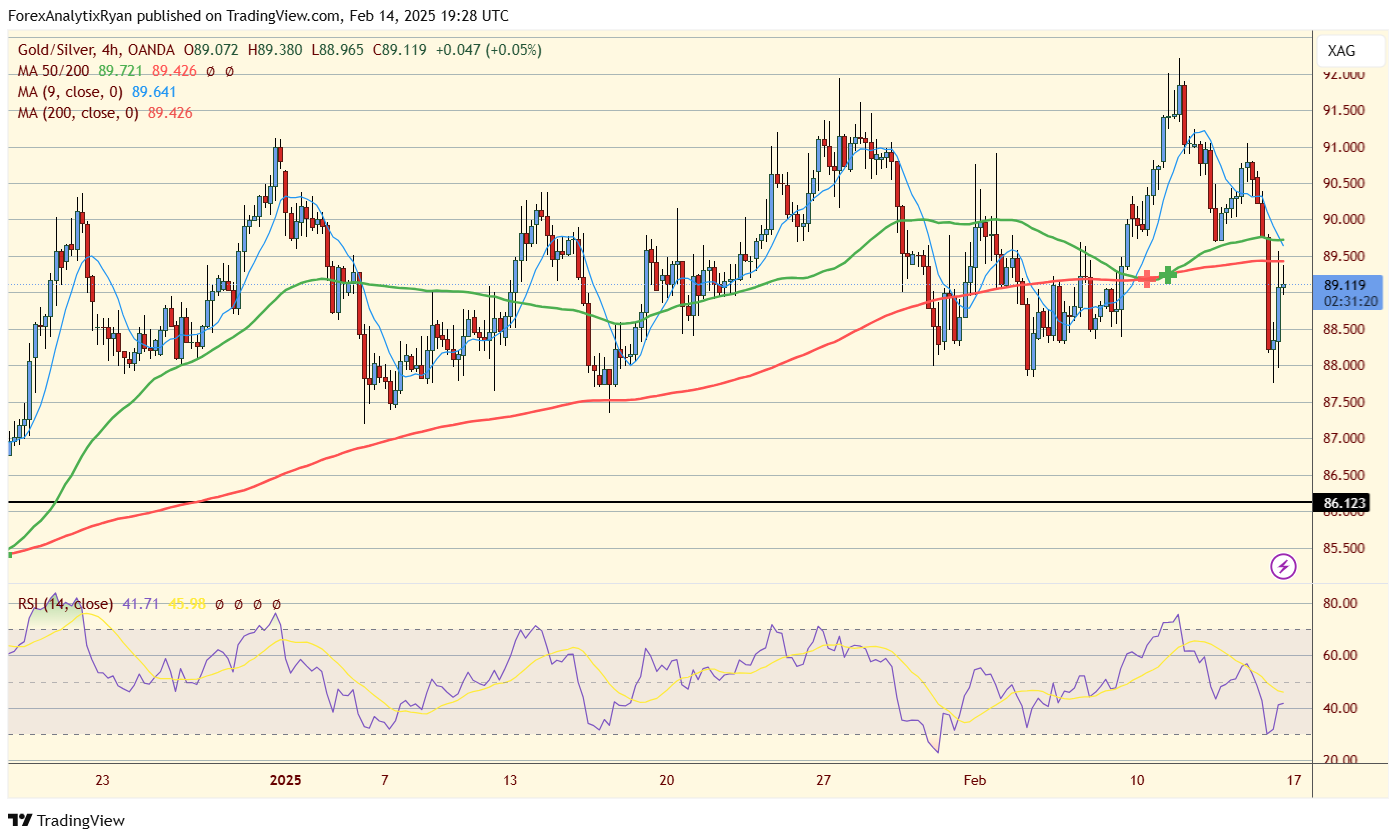Julian Brigden: The Administration Weighing Up Debt Swap?
The MI2 Partners co-founder on a potential debt swap, why this market is hard to trade, and how "Mr & Mrs Schmidt in Dusseldorf are funding little Johnny in Arkansas so he can sod off to Santorini..."
Who better to wrap up the week on Talking Markets with than Julian Brigden, co-founder of MI2 Partners (who write
)? Lots to get into here…US Potential Debt Swap Under Discussion?
Julian has been speaking to people close to the administration, and says that President Trump is considering a strategy to address US debt that would see allies exchanging treasuries they hold for new treasuries with a 100-year duration and zero interest.
Wait, what??!!
Okay, so:
When you’re the reserve currency, “you accrue certain advantages,” Julian said. “The typical advantage is that people are happy to buy your debt, which tends to repress your yields and keep them artificially low. That tends to encourage excess borrowing which encourages excess deficits. And as part of this deal to be the reserve currency, you typically have to provide defense to the rest of the world.”
And aside from defense, there are other costs to being the reserve currency too: “Typically you run an excessively strong currency, that tends to result in you hollowing out manufacturing and importing a lot.” (And as we know, the administration has talked a lot about reshoring, nearshoring, etc.)
The idea is purportedly that allies would essentially pay for US security by accepting these new 100-year treasuries in exchange for the existing ones (of course, there would likely be pushback - more on that in a bit).
Julian says this would be a “technical” default as the net present value of the zero-interest bond would be significantly less than the face value.
According to Julian’s source, “one of the most senior guys in the administration believes this is the last chance to address the deficit before it becomes unaddressable.”
If something along those lines happened, “[it] would be very dollar negative,” Julian said, though he added that he doesn’t believe it’s “coming imminently,” but it is being discussed.
The response in the live chat on YouTube was people dropping 💣💣💣💣 emojis, which sums up how big a deal this would be…
Thoughts?
US Stock Market
After dropping that 💣, let’s go back to where we are now. Julian says a lot of the market action since the start of 2025 can be attributed to positioning - “Hedge funds start the year with a clean slate, and so the thing you do not want to do is be down until you’ve accumulated some P&L where you can start playing with the chips more freely.”
And he does think “US equities are very overpriced.” “There was a great story in the Wall Street Journal about Chinese drug companies being bought by Big Pharma for a few hundred million dollars versus the billions of dollars that they were paying for unicorn startups in the US,” he said. “I think there were lots of things we may have just paid too much for.”
Add to that, we are in very volatile environment. “We have to try and look through some of the noise and try to figure out the direction and surf that vol,” Julian said. “The expression ‘tape bomb’ has a new expression under our new president.”
Trying to get even the direction correct is challenging: “Some of these moves are so disjointed that, you can be in what looks like a winning position one minute and the next minute, some tape bomb hits and you get ejected via the sunroof in a James Bond-esque kind of way,” he said.
Here’s what AI makes of that particularly colorful phrase 🤷♀️
💡”Run less risk, is ultimately what it means,” Julian said. “Risk is a function of what the model tells you, and that's a function of what the volatility of the underlying market is. So if we are moving into a structurally more volatile world, that has implications.”
The 3-Legged Stool
“What is really happening is that foreigners are buying US assets,” he said. “Their holdings of US Treasuries relatively have been going down and their holdings of US stocks relatively have been going up. It's been a great trade, but it's in a more volatile asset and it's being held not only by central banks who've got sticky hands maybe, but by individuals - Mr and Mrs Schmidt sitting in Dusseldorf are forgoing consumption today to fund little Johnny in Arkansas so he can sod off to Santorini.” (Or as JD put it, Americans “are living like Gatsby” in Europe.)
This is fine as long as the game keeps going, and that game is dependent on a “3-legged stool,” Julian said.
The strength of the dollar
That foreigners don’t need that money for domestic needs (i.e. if they have to start paying more for defense)
A strong US economy that continues to suck in capital
The macro trend is “massive vendor financing of US over-consumption,” Julian said. “If exceptionalism was spending money like a drunken sailor, then we’re pretty exceptional. The whole world is funding our extravagance by buying our assets, and never in modern [times'] has the US been more dependent on asset prices to underpin the economy.”
“And if all of a sudden, other people start consuming, whether it’s on defense, or rebuilding Ukraine - they need the money and we are the global piggy bank,” he said.
Sooooo US recession? “Not yet,” Julian said. “If anything, the biggest risk to the US is that growth is re-accelerating and that the Fed will have to raise rates again. And that's when the recession risk rises. Not yet.”
Metals
At M12 Partners, they were long gold for a long time, but have now “taken most of our gold off the table,” though he still holds it in his personal account.
“We think some of the final move up is related to the squeezes related to tariffs, some of the COMEX delivery issues that have been happening. We think this move is pretty extended now. I love it. I love gold… Tactically, I’d like to get a little pullback so I can buy some more.”
AS for silver, Julian is not holding it, but says: “I really want to buy silver. Silver is a reflation trade and typically does well in an environment where the dollar is weakening and the Fed is cutting rates. The dollar is showing signs of potentially weakening, I don’t think the Fed is cutting rates.”
🪢Side note, I got an email from Dale Pinkert following his Talking Markets ep on Wednesday, where he flagged that the Gold/Silver ratio collapsed yesterday (February 14):
Europe
Depending on who you’re talking to, Europe is on the brink of collapse or the verge of a renaissance. Here’s Julian’s take:
“We wrote a piece at the end of last year called Peak Pessimism. You had never, ever, ever seen people more bearish on European stocks and more bullish on US stocks in like 40 years. Never. Positioning was very extreme…. The question [now] does this turn in to more than just a bounce? Does the euro go from 101.5 to 106?
And I think a lot of that depends on what comes next. And that's quite hard. If you do a peace deal in Ukraine, and you force them then to pay for the rebuilding of Ukraine, then you are talking an inordinate amount of money that's going to be spent by the Europeans. And it is going to be spent in a very belligerent kind of way, where they're not feeling overly fluffy towards the United States. That is pretty bullish in an economy everyone thinks is done.”
🪢Look out for the results of the German election on February 23, per Jacob Shapiro and Doomberg.
To watch the full episode, right this way.
Enjoy,
Maggie
Important Disclaimer: It is crucial to remember that this article is for informational purposes only and should not be considered investment advice. Consult with a qualified financial advisor to assess your risk tolerance, investment goals, and overall financial plan.






